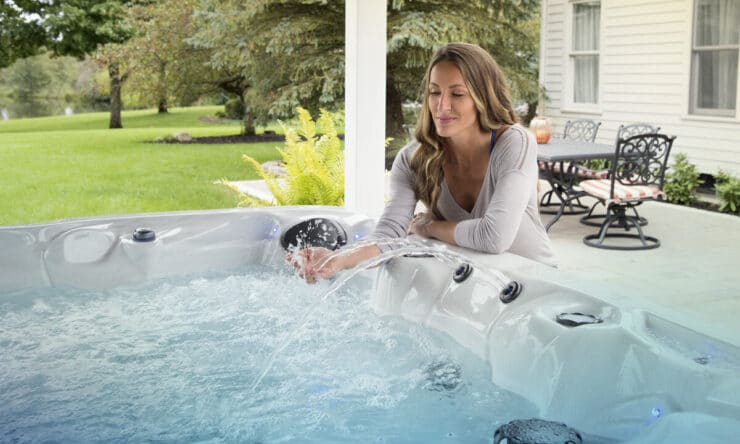This news might come as a shock but there are different types of sanitizer for your hot tub. And while you can use chlorine to “shock” your hot tub water, it’s different from the products labeled as a shocking agent.
As a hot tub owner, you want to keep your water as clean and clear as possible. Spa sanitizers are vital to being able to safely enjoy the water. But it’s just as important to know how to use each product and the differences between them.
Master Spas recommends using dichlor granules as a sanitizer and a non-chlorine oxidizer as a shock. These products work side-by-side with the EcoPur filtration system, taking advantage of natural minerals to purify your water. The result is water that is soft to the touch without the harsh chemical smell that you might associate with other spas.
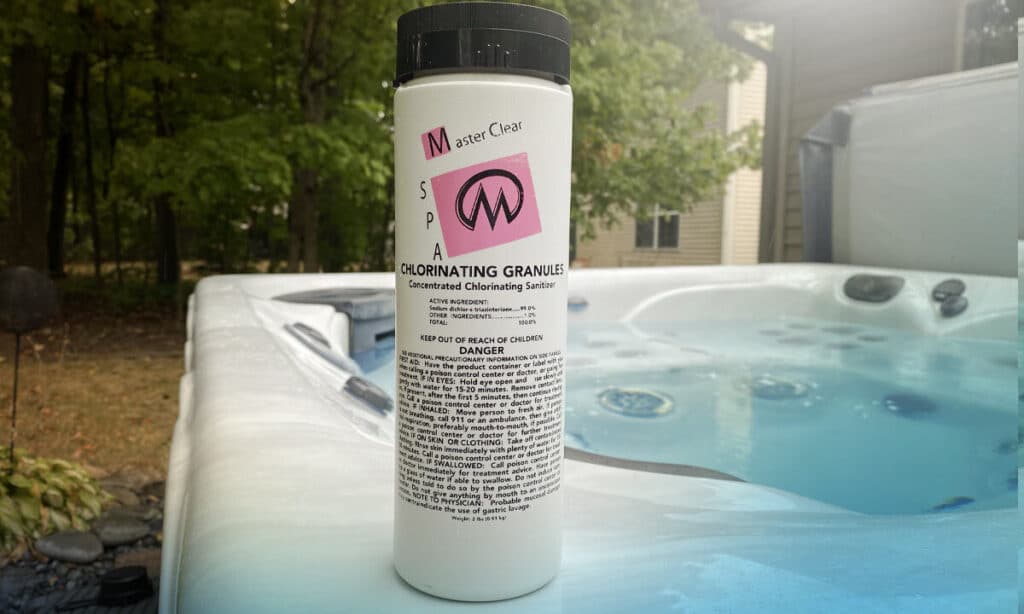
How chlorine works
Chlorine is a chemical. When you add it to the water, there will be a chemical reaction. But just how does it work in your hot tub?
The dichlor granules latch on to the things you don’t want in your water — bacteria, algae, and other organics. With the chlorine attached to the contaminants, the cell walls are broken down. The contaminants become, well, useless. (Although, when we are talking about hot tubs, algae is always useless.)
If you can remember anything about high school science, for every action, there’s an equal and opposite reaction. While that rule applies mostly to physics, there is some truth in hot tub chemistry. The chemical reaction between the dichlor and organics will create a by-product. These chloramines are also known as combined chlorine, or total chlorine if we’re talking chemical levels.
You will need to keep your chlorine between 2 to 5 ppm for effective sanitation. If your total chlorine is above the recommended range (and your hot tub chlorine is low), there are too many chloramines in the water.
Chloramines build up in your spa water, and they can cause a chemical odor. The solution? Oxidizing the chloramines with a shocking agent. And this is the part where it’s important to understand the difference between hot tub chlorine and oxidizer.
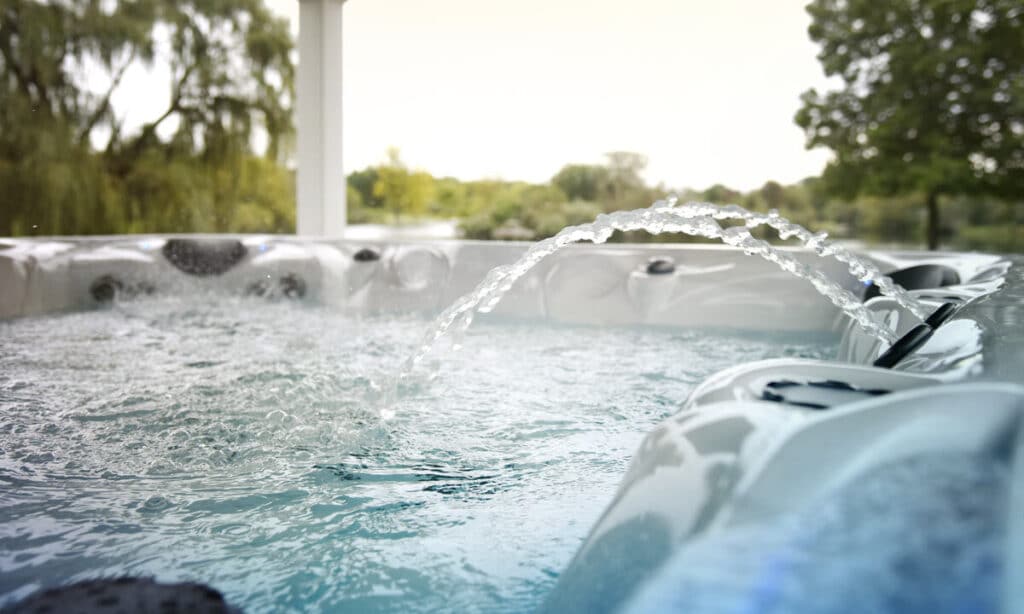
Chlorine for a hot tub
Chlorine is chlorine, right? Wrong! There are five types of chlorine — sodium hypochlorite, lithium hypochlorite, calcium hypochlorite, dichlor, and trichlor. Each type of chlorine has a different chemical make-up and intended use.
According to The Chlorine Institute, “chlorine is an essential chemical building block, leading to a myriad of materials that are used to make the products we use every day for health, safety, nutrition, security, transportation, lifestyle and high-tech innovation.”
For example, sodium hypochlorite is made by combining chlorine and sodium hydroxide. It is a great disinfectant and antimicrobial product. Most people would know it as bleach.
Dichlor and trichlor are stabilized with cyanuric acid, which acts as a sun protectant for the chlorine. The addition of cyanuric acid makes these types of chlorine ideal for use in outdoor pools and hot tubs.
But just because dichlor and trichlor have similar properties and can be used in similar ways, they cannot be used interchangeably.
Dichlor for your spa
Dichlor chlorine granules are pH neutral, making it ideal for use in hot tubs. Using this type of chlorine will not affect the pH of your hot tub water. Most dichlor has between 55% and 62% active chlorine.
Another reason you should use dichlor in your hot tub is that it dissolves more quickly. Simply sprinkle it over the surface of the water and turn on the jets.
A quick note: You might think you can pre-dissolve the chlorine in a bucket of water with water before adding it to your hot tub. This practice is common with some types of pool products. However, it is not recommended for hot tubs and you should never do that.
Another chlorine no-no? Using chlorine tablets in your Master Spas hot tub — even if it is dichlor. While adding a tab to a floater seems like an efficient way to maintain the chlorine in your hot tub, it will actually void your warranty.
Trichlor? Try no
A pool is not a hot tub — you get that. However, the water care can be very similar. Pools and hot tubs will both use some kind of sanitizer, often chlorine.
However, pool owners use trichlor tablets. These are not recommended for use in a spa because it is very acidic. It also dissolves more slowly, which can cause damage to the acrylic shell of your spa. This type of chlorine for pools can also discolor your spa, leaving a permanent ring on the water line.
Another consideration is the water temperature. Pools are kept at much lower temperatures than a spa, sometimes 20 degrees lower. The temperature of the water affects how the sanitizer works. Pool chemicals, like trichlor, are not designed to work when you keep your water at a soothing 102 degrees. They will lose their effectiveness in the warmer water.
Other types of pool chlorine might have higher concentrations of calcium, which can build up in the components of your hot tub. The calcium in the heater, plumbing, and on the shell can damage your hot tub. This damage will not be covered by your warranty.
Using trichlor in a Master Spas hot tub will void your warranty.
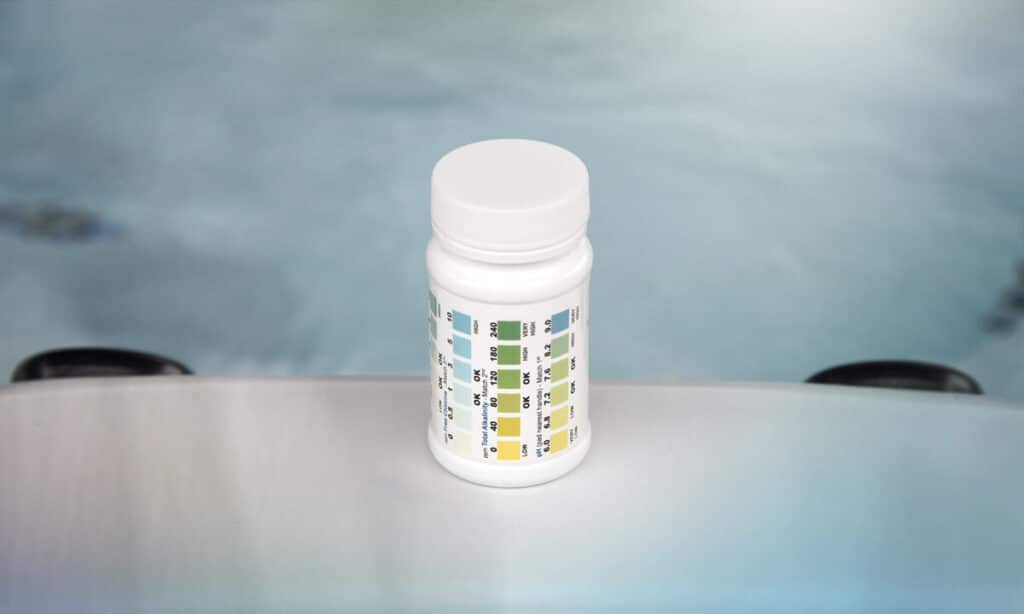
Shocking your hot tub
Does your hot tub water smell like chlorine? Well, it shouldn’t.
While you do add chlorine to your spa water, your water should smell fresh and clean. If it begins to have a chemical aroma, it’s time to add shock. Why? The smell of the water is a result of chloramines, which is a natural by-product of the sanitizing process.
Anytime there’s too many contaminants in your water, whether it’s chloramines or bacteria, your sanitizer has to work overtime. The harder it has to work, the more challenging it will be to keep hot tub chlorine levels in the proper range.
A sign that you need to shock your hot tub is when the total chlorine is higher than the free chlorine. Most spa chemical test strips will measure total chlorine.
The shocking agent, typically a non-chlorine oxidizer, breaks down the chloramines so that they can help in the sanitizing process. Basically, it becomes chlorine again.
There are two types of shocking agents — chlorine and non-chlorine. Most non-chlorine shocks are labeled as oxidizer, a nod to the chemical reaction. (There’s that high school science again!)
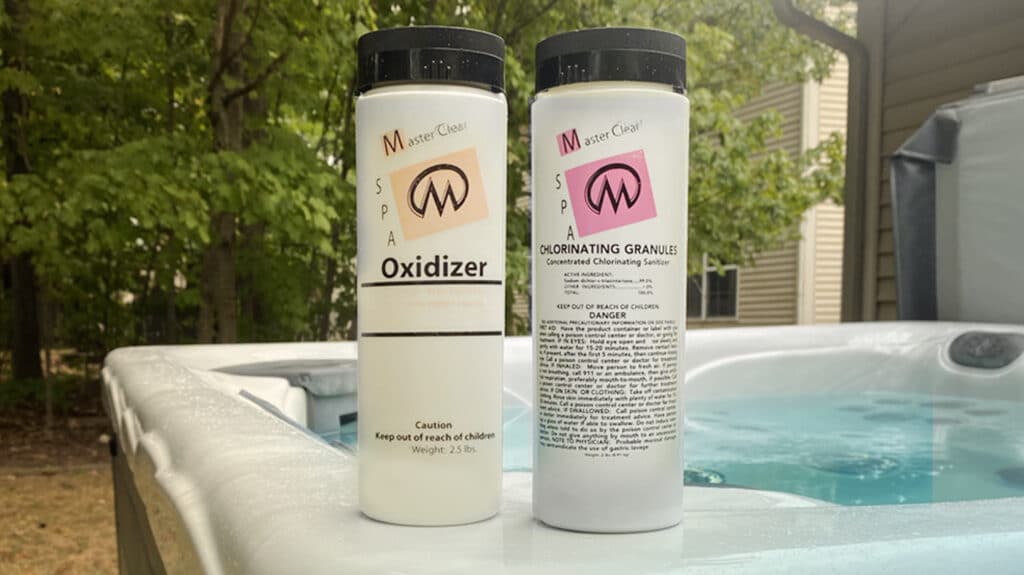
Chlorine vs Oxidizer
A non-chlorine oxidizer removes contaminants from your water. These can include body oils, lotions, ammonia, and sweat.
One of the benefits of using a non-chlorine oxidizer is that it allows your chlorine to do its best work in the hot tub water. The oxidizer breaks down chloramines and other organics, which deplete your chlorine.
You will notice that after using an oxidizer, your water will smell fresher and be gentler on the skin.
Master Spas recommends using the non-chlorine shock about once a week, or when the total chlorine is higher than the free chlorine.
When do you add chlorine? You should add a small amount after each use. Be sure to follow the manufacturer’s recommendations, which you can find on the bottle.
Stress less, relax more
Hot tub maintenance does not have to be stressful or time consuming. With a Master Spas hot tub, you can enjoy the benefits of hydrotherapy. Learn more about the EcoPur filtration system, which works with chlorine and an oxidizer. Or, contact your local Master Spas retailer to learn more about spa ownership. Wondering how much a hot tub costs? You can request a quote here.


